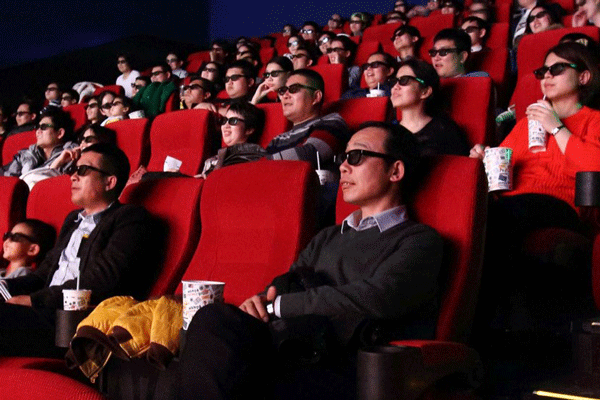
China is fast overtaking the United States in becoming a top film market, contributing 34,75% to The Fate of the Furious’s record breaking global box office opening weekend of $531,98 million.
movies with Tatira Zwinoira

The eighth film in the Fast and Furious film franchise overtook the 2015 film Star Wars: The Force Awakens which earned $529 million in its opening global box office weekend.
By the end of last weekend on Monday morning, The Fate of the Furious (Fast 8) became the all-time opening weekend global box office earner.
Locally, Ster Kinekor Zimbabwe cinemas have seen increased traffic of cinema goers seeking to watch Fast 8 since it premiered last Friday.
On its opening day, the Zimbabwean audience showed its love for the Fast and the Furious franchise by coming in their numbers to see the film.
As a result, Ster Kinekor’s 2 372 total seating capacity in the country saw 95% being taken to watch Fast 8 when it premiered.
In its global box office earnings, China contributed $184,9 million to Fast 8 — a stark contrast with the $98,78 million it made in the United States, a near doubling of 87,18%.
- Chamisa under fire over US$120K donation
- Mavhunga puts DeMbare into Chibuku quarterfinals
- Pension funds bet on Cabora Bassa oilfields
- Councils defy govt fire tender directive
Keep Reading
As of Monday, Fast 8 had made $107,31 million in the United States while the film further increased its box office tickets to $193,93 million in China.
Even with Fast 8’s Wednesday box office grossing of $120,35 million in the United States, the film is still way below China’s Monday figure.
The last time the middle kingdom saved a big Hollywood franchise was with 2014’s Transformers: Age of Extinction. The film earned a total of $245,43 million in the United States at the box office and $320 million in China.
The earning was despite an opening weekend in the United States for the fourth Transformers film of $100,03 million compared to $92 million in China.
China’s contribution represents a significant shift in film trends for Hollywood producers as they can now rely on the Chinese film market for revenue and not just the American one.
What is fuelling this shift is the rise in the middle class of China due to it having the world’s largest population of nearly 1,4 billion. In the United States, the population is nearly 320 million.
Since the middle class in any economy spends more, this class in China represents a huge market for Hollywood.
According to a 2016 study by international research firm McKinsey & Company, 54% or 394, 2 million people of urban households were considered “mass middle” class in 2012.
The study showed these people had an income between $9 000 and $16 000 per year.
Comparatively in the United States, the middle class is smaller at nearly 159, 77 million persons earning between $25 000 and $75 000 a year, according to latest data.
As such, with the cost of living being 41,41% lower in China than in the United States, the middle kingdom has a bigger disposable income than in America.
With ticket prices being an average of $6,50 in China and $8,61 in the United States, the film market in terms of dollars is more lucrative in China. In monetary terms that makes the Chinese film market worth $2,56 billion compared to $1,37 billion in the United States.
A film’s overall box office can be seen in its opening weekend, which is why Fast 8 has been making headlines this week.
The reason why opening weekends are overly analysed is because film tickets are traditionally more expensive so the higher the number, the more likely the film will be a long-term box office earner.
In China, opening night tickets can go as high as $26 per ticket for big budget films whereas in the United States it reaches nearly $20. But, as a film continues to be screened in cinemas, this amount is reduced to the average ticket prices.
In 2016, one American scholar explained that the reason why Hollywood films do well in China was due to Chinese audiences being much more interested in foreign films than moviegoers in the United States.
The scholar, director of UC Santa Barbara’s East Asia Centre and author of a series of books about Chinese film culture, Michael Berry, was on record saying films with comedy and escapist adventures elements tend to do particularly well.
This is why films in the Marvel Cinematic Universe have been performing particularly well in China due to their campy, not so serious tones.
Also, the Chinese government has very specific terms of the films it allows to be screened to its public which favour big budget films.
Berry went on to say there is huge interest for film in China and that it is almost completely funnelled towards the commercial film model associated with big budget films.
In this regard, Fast 8’s huge action, thriller, suspense, stunts and fast-paced sequences resonated well with the Chinese film lovers.
Going by this logic, Fast 8 can only continue to earn at the global box office as the film’s Chinese box office takings are expected to be huge in the middle kingdom.
Globally, as of Wednesday, Fast 8 had made $685,45 million, with crossing the $1 billion globally pretty much a guarantee at this point.
Beauty and the Beast became the first film in 2017 to cross the $1 billion mark in the global box office, making it the current highest grossing film of 2017. As of Wednesday, the film’s global box office earnings was $1,04 billion.
Beauty and the Beast is also the highest box office draw in United States, with $459,83 million as of Wednesday as well.











